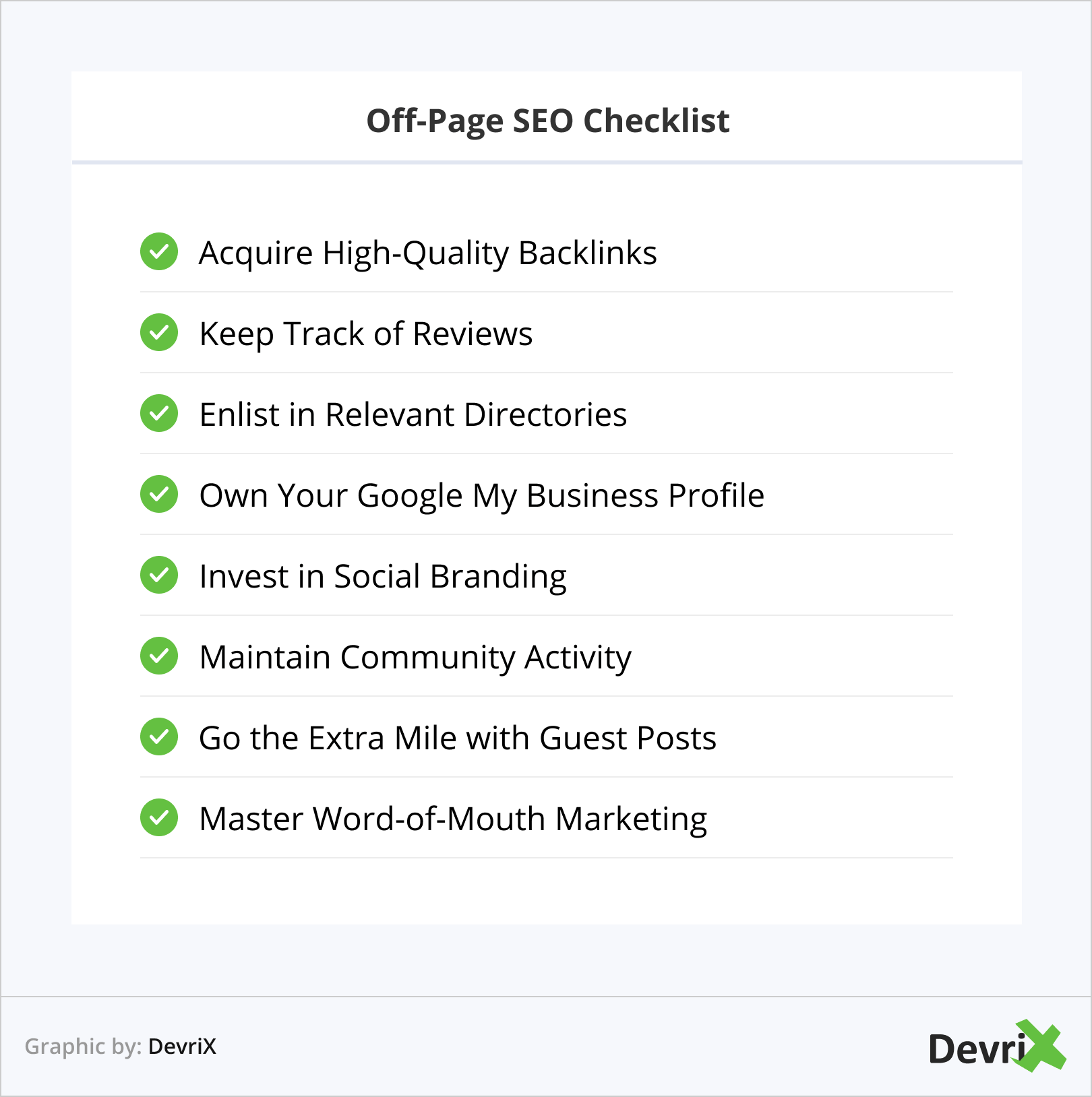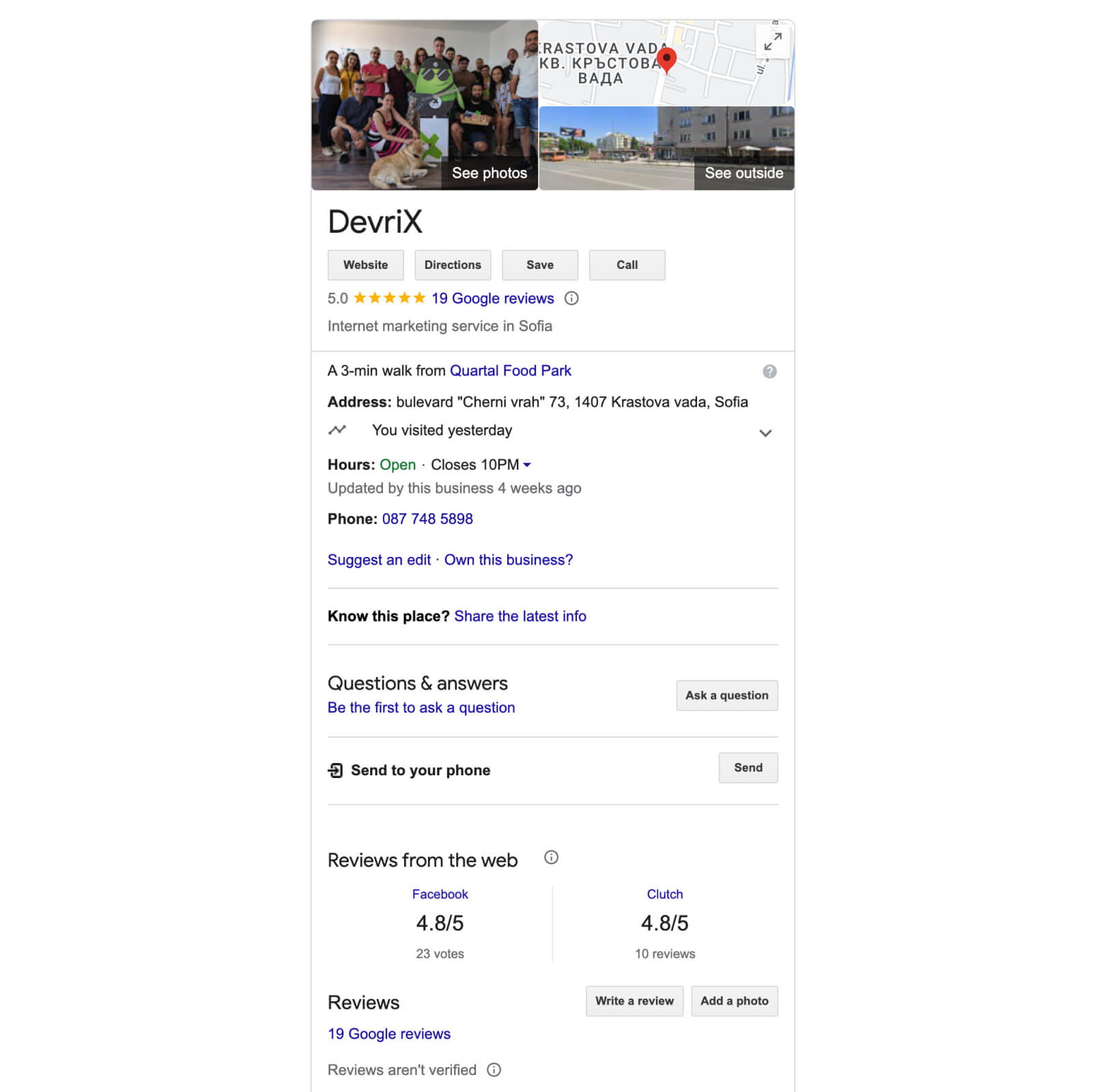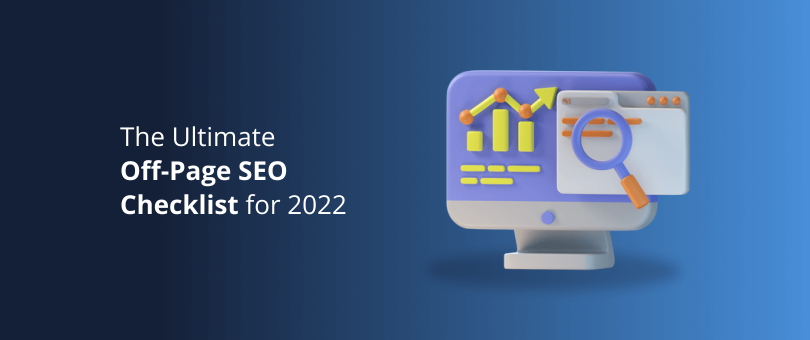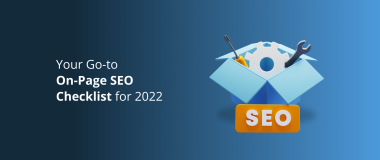Off-page SEO is one of the 4 pillars of SEO and a top priority in search engine optimization. That’s because regardless of what great content, quality, and value you provide, if there’s no one there to vouch for you and confirm your expertise, to Google, you are as good as a ghost.
When it comes to off-page optimization, the focus usually falls on backlinks. However, they are not the only thing that matters.
In this off-page SEO checklist, we’ll highlight all the factors that you should take into account when building a strong digital presence that boosts your performance in search engines.
Hint, hint: It’s all about reputation and credibility.
Let’s get on with it!

1. Acquire High-Quality Backlinks
While backlinks are not the only important off-page SEO factor, they are still the most important one.
In fact, in its study of 11.8 million Google search results, Backlinko discovered that the more backlinks a page has, the higher it ranks. Also, links in position 1 in the SERPs usually have 3.8 times more backlinks than the rest of their page 1 counterparts.
However, it’s not just about quantity – it’s about quality.
Google’s John Mueller confirms that backlinks that are not relevant have little to no value and the algorithm may discard them whatsoever. One quality link from a high-authority website is worth hundreds of meaningless random ones.
Still, securing high-quality links is challenging.
To ensure that your efforts are not in vain when working on your strategy, consider the following:
- Content Quality. Create content that other businesses find valuable and want to recommend to the audience.
- Reaching Out to the Right Websites. Look for partnerships that make sense – the better match you are, the more likely they are to agree to include your link, and the more value it will have.
- The Competitor Link Gap. Check what businesses are linking to your competitors and approach them to link back to you as well.
- Creating Your Own Gap. Find backlink niches that your competitors are not exploring and work on acquiring links there.
- Reducing Reciprocal Links. Google doesn’t look good on link exchanges, and relying too heavily on those may, potentially, hurt your SEO.
2. Keep Track of Reviews

Reviews are rarely seen as a top priority in off-page SEO.
However, what customers say about you can strongly affect your reputation and that’s something that search engines really care about.
Google values expertise, authority, and trustworthiness (EAT), and the image and credibility of the business play an integral part in it.
If the negative reviews start to outweigh the positive ones, this may, potentially, affect your standing with search engines and your hard-earned rankings may suffer.
Furthermore, an unfavorable reputation can reflect on how new customers feel about you and may compromise your traffic, conversions, and sales, which, in turn, can also be a red flag to the search algorithm.
To reduce the risk, make sure to manage your reviews (even if they are on third-party platforms):
- Ask for Reviews. Encourage happy customers to say a good word about you and your products.
- Answer Bad Reviews. Try to fix whatever issues caused the negative feedback, and improve the way the customer feels about you.
- Embed Third-Party Platforms on Your Website. This will make it easier for Google to associate your profiles there with your brand.
- Improve Customer Service Satisfaction. The best way to obtain positive reviews is to provide great customer service and care deeply about what you provide.
3. Enlist in Relevant Directories
Directories are often underestimated when it comes to off-page SEO because the types of backlinks they provide are not considered very valuable.
While this is somewhat true, signing your company up in relevant directories such as industry, niche, and local business indexes can be a worthwhile source of traffic and awareness.
Customers tend to review such websites when they are researching their purchasing options. When they find your name there, this will put you on their radar – they may visit your website, reviews, and social media profiles.
Also, Google, more often than not, shows these lists in the SERPs associated with relevant keywords, and this may boost your chances even further of gaining new traffic.
As a result, even while the backlink is not of high authority and may not contribute to your link profile, it can still benefit your SEO.
4. Own Your Google My Business Profile

Your Google My Business profile is, practically, an off-page SEO goldmine.
Users nowadays have become accustomed to looking to Google’s info panels for verified and valuable information on any topic.
The Google My Business profile shows up in the SERPs not only for branded but for relevant unbranded keywords as well. In it, new and returning customers can find details about your company, website, brick-and-mortar locations, services, working hours and answers to frequently asked questions.
You can create the profile yourself, or leave it to Google who detects the existence of your business in one way or another and automatically creates a listing.
However, to be able to control what information shows up in your listing, you need to own it and regularly update it.
This way, you can not only increase your traffic and provide valuable information to your customers, but you can also acquire more SERP and boost your SEO branding.
For example, the images featured in the listing could show up in image vertical search, and, eventually, bring the user to your website.
Also, the Q&As in the FAQ section can, potentially, become featured in the “People Also Ask” feature in the SERPs.
5. Invest in Social Branding
As mentioned, Google looks for all kinds of ways to verify your existence, check your credibility, and make sure that you are legit.
Social media platforms are the easiest way to do that.
In fact, you should create profiles on all the popular platforms, even if you don’t plan on building a presence there. Just leave a message pointing your potential followers to where you are (or intend to be) most active.
However, it’s advisable to create a strong social branding and presence on at least one platform – preferably, the one that your audience favors the most.
There, you can share links to your website, engage your audience, and build a connection with them. The better job you do of it, the more traffic you can look forward to.
Furthermore, Google keeps an eye on social media platforms, they even occasionally show posts from there in the SERPs. If your profiles garner high activity both from your side and from your customers, the search engine algorithm is likely to notice, and this can, potentially, positively affect your SEO.
6. Maintain Community Activity

Joining relevant industry and niche communities such as forums, support groups, and platforms like Quora can go a long way.
There, you can join conversations, share your ideas, and find out more about what people in the industry care about and how you can contribute. As a result, you can build meaningful relationships with people in your industry, get to know your audience, and establish your name as an expert in your field.
On top of that, you can even find ideas for new content on topics that may interest your audience and provide value.
All in all, communities are a great place to network and boost your reputation.
There’s a link-building opportunity in it as well.
In your profile and personal information, you can place a link to your website and mention your expertise and experience. This way, if other users notice you, they can check your credentials and learn more about your business.
However, if you want to share links to your content in posts and comments, you should tread carefully.
Users in these communities are there for genuine communication and exchange of ideas, if they start to feel that you have a different agenda – such as promoting your content – they may well kick you out.
7. Go the Extra Mile with Guest Posts
Guest posts are not all about the backlinks.
Of course, they do help you build relevant high-quality backlinks, that’s a fact.
However, their true worth is in fortifying your reputation as an expert in your field.
This contributes to your Google EAT because search engines favor content that is created by competent professionals, especially when it comes to YMYL pages.
When other brands publish your content on their platforms, this shows that they value your expertise and respect your competence and reliability – which can positively affect your Google standing.
For all this to happen, though, you need to approach guest blogging the right way.
Today, many marketers create guest posts only for the sake of the backlink. They create mediocre content and look for someone to publish it and link to their website in the bio. So, why not sneak in a link to their product as well?
Well, while this might be an easy thing to do, and it may deliver some results, it is not necessarily the best approach to take. Simply, because it can, in fact, hurt your credibility more than it benefits your business.
To maximize the potential of guest blogging, consider reaching out only to websites with higher authority than yours. Next, offer them high-quality, valuable content that may not only interest their audience but shows that you are a true expert.
The better your content is, the more that credible websites are likely to publish it. And the more credible websites publish your content, the more positive the impact on your reputation.
And, as mentioned, when it comes to off-page SEO, reputation is gold.
8. Master Word-of-Mouth Marketing

Word-of-mouth marketing can be fueled by PR campaigns, social media games and challenges, influencer partnerships, and whatever else inspires people to talk to your brand and visit your website.
These types of marketing activities create a buzz around your name and boost the audience’s interest in your brand and products. As a result, people start keying your branded keywords into searches, and your direct traffic and social media engagement grow.
This shows search engines that you are important and – even better – that you are trending. To join in on the trend, they may, potentially, show your links more often in the SERPs.
Of course, these types of off-page SEO boosts have a fleeting impact. When the hype is over – so is the traffic associated with it.
However, they still can bring in long-term value, because they create awareness, increase your audience and following, and improve your SEO branding.
Also, if you occasionally launch fresh word-of-mouth campaigns, you can ride the wave for longer.
To always be in the loop of what people are saying about you, consider keeping track of mentions online (using Google Alerts) and on social media (using social listening tools).
Bottom Line
Search engine optimization doesn’t end with just taking care of your website and content. In fact, it doesn’t even end with backlinks – it involves everything about you and your presence on the internet.
By following this off-page SEO checklist, you can ensure that your online reputation and credibility are immaculate and can satisfy the requirements of both search engines and users.
Combined with the rest of the 4 SEO pillars – on-page SEO, technical SEO, and content – you can achieve the ultimate search engine optimization, and boost your digital success.




